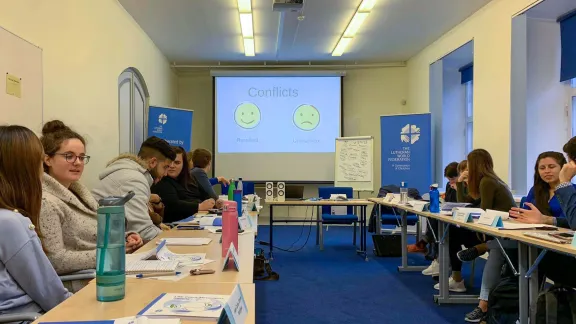
Participants in the 2019 LWF Peace Messengers training workshop in Tallinn, Estonia. Photo: LWF/S.Kit
Webinar showcases vital role of young people in advancing interfaith solidarity, peace and security
(LWI) - Young peacemakers from different countries and diverse religious communities held an online brainstorming session on 1 December to share lessons learnt from their work during the COVID-19 pandemic.
A webinar entitled ‘Youth as Agents of Change’ showcased problems encountered and best practices developed over recent months by three young interfaith experts – a Lutheran human rights activist from Indonesia, a member of the Muslim Youth Forum in Finland and a Hindu representative of Religions for Peace in South Africa. The live streamed encounter was organized by the Lutheran World Federation (LWF), the World Council of Churches (WCC) and the Network for Religious and Traditional Peacemakers (NRTP).
Moderator Ms Jessica Roland, NRTP’s senior specialist on inclusive peace, opened the discussion by affirming the key role that youth leaders and organizations have played in disseminating accurate information about the COVID-19 virus, while seeking to dispel harmful narratives spread through social media. All three of the young presenters urged people of faith to be more active in sharing stories of solidarity and cooperation to counter hate speech and negative narratives around religious divisions and conflict.
Interconnectedness of human family
Mr Fernando Sihotang, human rights and advocacy coordinator for the LWF’s National Committee in Indonesia, spoke of the huge challenges brought by the pandemic in his country, including a loss of livelihoods, an increase in gender-based violence and a decline in education due to the lack of internet access affecting so many marginalized communities.
But he also highlighted the way the pandemic has brought people together as they became more aware of the interconnectedness of the whole human family. “People joined hand in hand to support each other,” he said, “to look for undeniable commonalities, instead of debating our differences.”
As well as creating meeting spaces for people of different faiths to discuss “a common language of togetherness,” Sihotang said young people are also supporting practical interfaith efforts in many areas of justice, peace, climate action and human rights advocacy. These include campaigning for a long delayed anti-sexual harassment bill, speaking up about corruption, monitoring abuses of religious freedom laws, making petitions about mining projects and offering education on diversity and multi-culturalism in the majority Muslim nation.
Practical cooperation with faith communities
Speaking about the situation in Finland, Ms Kosar Mahmoodi, project coordinator for the Muslim Youth Forum, said the pandemic has brought closer cooperation between secular authorities and faith communities “because we all have the desire to promote peace and security in this world.” Research is currently underway to assess the need for a new center dedicated to religious dialogue, she noted
Mahmoodi pointed to a number of initiatives that youth leaders have been involved in through the National Forum for Cooperation of Religions in Finland, including peace walks, webinars and joint statements. They helped distribute accurate information about COVID-19 in different languages to minority communities and promoted a video from local authorities sharing greetings with Muslims for Ramadan, “which promoted solidarity during the pandemic,” she said.
Ms Merylene Chitharai, a member of the Religions for Peace Youth Media Team, based in South Africa, talked about the opportunities that online platforms offer in terms of connecting and cooperating with people in different parts of the globe. She shared details of a successful e-conferencing project, developed in partnership with the Africa Women of Faith Network, to train young women across the continent in social media skills for business or other activities.
“Become the change you wish to see”
All three presenters acknowledged the challenges of the ‘technology gap’ for marginalized communities, as well as the physical and psychological effects of spending so much more time in front of a computer screen. Chitharai also spoke of the need for young peacemakers to “translate webinars into actions” and to set positive examples in order to “become the change you wish to see in the world.”
Recalling the 2015 UN Security Council resolution on Youth, Peace and Security, which urged governments to give youth a greater voice in all levels of decision-making, the young interfaith activists agreed that more needs to be done to include – not just token but meaningful - youth participation at the peacemaking table.
Thanks to their technological adeptness and growing interconnectedness, young people are uniquely placed to bring innovative approaches to understanding marginalization and violence in society.
Rev. Dr Sivin Kit, LWF’s program executive for Public Theology and Interreligious Relations, commented: “Thanks to their technological adeptness and growing interconnectedness, young people are uniquely placed to bring innovative approaches to understanding marginalization and violence in society. Their participation in advancing interfaith solidarity is imperative.”
LWF/P. Hitchen
Webinar: Youth as Agents of Change from Lutheran World Federation on Vimeo.


